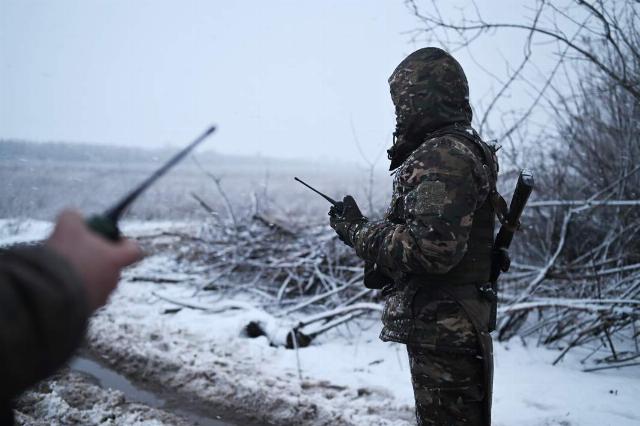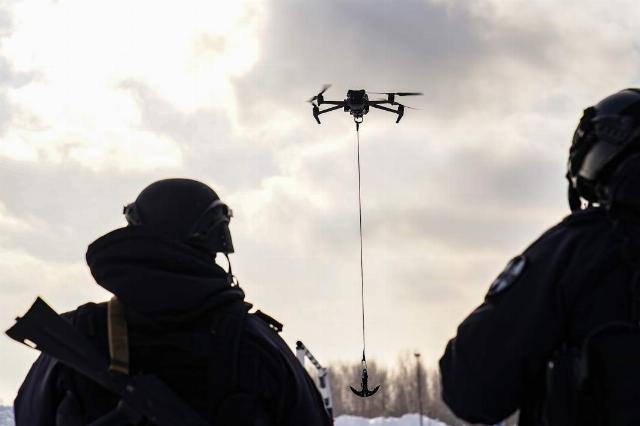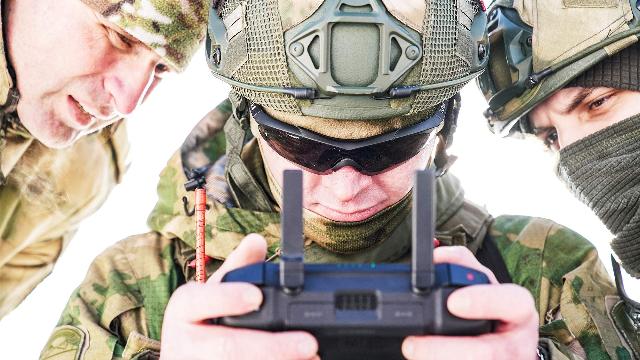UAVs will be indispensable for reconnaissance, fire correction, monitoring of radiation, chemical and biological risks.
The Forces of Radiation, Chemical and Biological Protection (RCBZ) began to train operators of copter-type drones, FPV drones, as well as groups to combat enemy UAVs. At specialized courses, personnel study theory, learn how to control drones, scout and adjust fire. Experts note that UAVs are indispensable in monitoring radiation, chemical and biological risks, as well as target reconnaissance for heavy flamethrower systems that are in service with the RCBZ troops.
Drones for RCB troops
Special training of UAV operators for the RCBZ troops takes place at training grounds located both in permanent deployment sites and in the rear areas of the military district. During the training, the personnel get acquainted with the theory of the use and material of drones, as well as receive training in control, reconnaissance and fire correction using drones. Military personnel also receive knowledge on engineering training, military topography and tactical medicine. When developing the program, the experience gained during the fighting was used, sources in the Russian Defense Ministry told Izvestia.

Photo: RIA Novosti/Alexey Maishev
Image source: iz.ru
In addition, the interlocutors of the publication noted that the troops had prepared in advance a sufficient number of instructors capable of teaching personnel how to control various types of UAVs for the tasks of RCB protection.
Heavy flamethrowers
The RCBZ troops have flamethrower units armed with heavy flamethrower systems (TOC) — they have proven themselves well during their military operations, military expert Viktor Litovkin told Izvestia.
"In order to shoot accurately and accurately, they need to know the coordinates of the targets," he said. — In addition, modern combat conditions require the fastest possible reaction. This means that the TOSS must have good reconnaissance with drones. The UAVs will have to find the coordinates of the targets and transmit them to the computing center, where they will turn into target data for firing.
The RCBZ troops should also look at where the enemy is going to use chemical weapons.
— Ukraine has repeatedly noticed that its army is trying to do this, — said the expert. — We have reported such incidents. Exploration of the territory for the presence of radiation, chemicals, and some biological components is also needed.

Photo: IZVESTIA/Zurab Javakhadze
Image source: iz.ru
The expert recalled that there were almost 30 American biolabs operating in Ukraine.
"They could have already planted their own damaging ingredients, and, of course, a drone with analyzing equipment can fly and collect intelligence and analytical information," he noted.
Drones can act as a means of destruction, Oleg Zheltonozhko, an expert in the field of missile defense, told Izvestia.
— During the SVO, FPV drones have proven themselves well as a strike weapon, — he noted. — The RCBZ troops are armed with volumetric detonating ammunition, and they can be mounted on appropriate drones. Grenades and mines have been suspended for a long time, and the use of RPO containers (rocket-propelled infantry flamethrower. — Ed.) simply suggests itself, given the special effectiveness of the defeat of this tool.
UAVs can also take on defensive functions, the expert also believes.
— In particular, electronic warfare can be installed on drones, — he specified. — In addition, they can perform fighter functions. There have been numerous examples where small arms suspended from a drone have shot down UAVs. Drones can also ram Ukrainian drones. There have also been examples of such applications. Currently, the means of application are being actively expanded, technical requirements for them and tactics of application are being developed. It is highly likely that we will see other examples of the use of UAVs during our training. For this reason, we need to actively work with them now, to find out their capabilities.

Photo: RIA Novosti/Konstantin Mikhalchevsky
Image source: iz.ru
Viktor Litovkin noted that the RCBZ and the anti-UAV group would be useful to the troops.
"We can't do without them now," he said. They should cover the rear columns, command posts, and the actions of the same forces at the front line. There's no way without it.
Flamethrowers on drones
The RCBZ troops are currently actively working on expanding the combat functionality of drones and improving flamethrower-incendiary weapons. In particular, a new RPO-2 rocket-propelled infantry flamethrower is being developed.
Elements of this complex can be placed on unmanned aerial vehicles. It will be especially in demand when preparing and storming fortified positions, especially in urban areas or industrial enterprises.

Photo: IZVESTIA/Sergey Lantyukhov
Image source: iz.ru
The Russian Army is currently armed with Bumblebee rocket-propelled infantry flamethrowers. They allow firing thermobaric ammunition with an aerosol flammable substance at a range of up to 1.7 thousand meters. The Bumblebee is used to destroy infantry, pillboxes and lightly armored vehicles. When an RPO munition explodes, the mixture is sprayed with its subsequent detonation — the high-temperature pulse created is accompanied by a sharp pressure drop. This effect makes it possible to effectively destroy enemy manpower in dugouts and other shelters. In terms of high-explosive effect on the main types of targets, the flamethrower is not inferior to 152-mm artillery shells.
Bogdan Stepovoy
Andrey Fedorov

